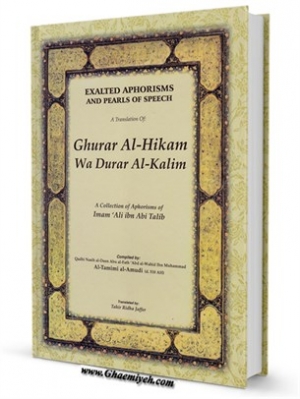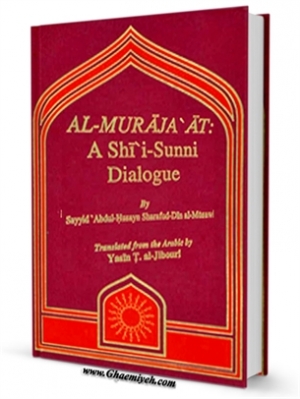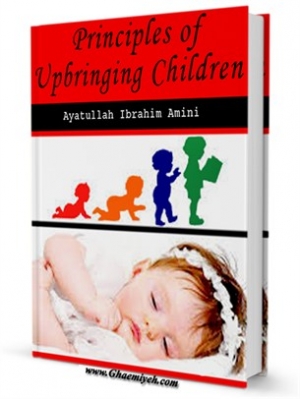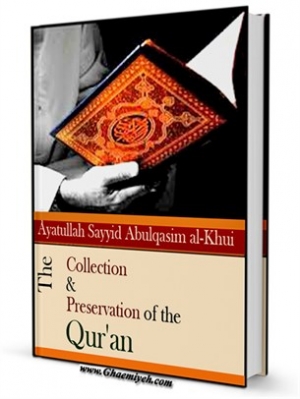Super User
Jami' al-Sa'adat (The Collector of Felicities) written by Mohammad Mahdi Naraghi, by correction and annotation of Sayyed Mohammad Kalantar and introduction of Mohammad Reza Mozaffar is an ethical book in Arabic and in the year 1196 (lunar).
Structure
The book begins by two introductions from Shaikh Mohammad Reza Mozaffar and the author, and the materials of the three volumes divided in three sections.
This book as the author says contains one part of old practical wisdom (morality) and doesn't state about other parts –organizing home and governing cities- because his goal of writing this, is only discussing about modifying the soul and refinement of morality.
The author mostly is inspired by the book "Tahzibol akhlagh va Tathirol Aragh" and "Akhlaghe Nasri" written by Abu Ali Moskovaih and Khaje Nasiroddin Tusi respectively.
This book like other ethical books in Islamic periods has not have an outstanding position. The reason of this happening is lack of attention to morality science seemingly.
The scholars of morality have been teaching moral matters by their actions and behaviors rather than saying and writing; that’s because not only morality is obtained by studying moral books but by permanent practice and upbringing specially in childhood before learning reading. Therefore if studying book was enough for getting promotion in morality, moral books would had been more precious and additionally one moral book would be enough for all human beings.
The Ghurar al-Hikam wa Durar al-Kalim is the most comprehensive collection of short quotations and aphorisms by Ali ibn Abi Talib. It contains about 11,000 short sayings, these short sayings has been sorted alphabetically and divided into ninety one sections. These short sayings have been collected from various books such as Nahj al-Balagha, The hundred words of Al-Jahiz, Tuhaf al-Uqul and Dastur ma'alim al-Hikam of Ghazi Ghaza'i. However Nasir Makarem Shirazi says this book can not be used as a reference because Tamimi has omitted the references of its hadiths.This work has recently been translated into English.
Qadhi Nasih Al-Deen Abu al-Fath Abd al-Wahid Ibn Muhammad Al-Tamimi Al-Amudi was a scholar that was lived in the fifth or sixth centuries AH. There is disagreement between scholars that he was shia or sunni. Muhammad Baqir Majlisi, Mirza Abdollah, Mirza Husain Noori Tabarsi, and Ibn Shar Ashoob are mentioned him as a Shia scholar in their works. He was one of the students of Al-Ghazali and master of Ibn Shahr Ashoob.
There are many Persian translations of this book and the only available commentary of this book is written by Agha Jamal Kwansari. Tahir Ridha Jaffer has translated this work in English.
A Shiʼi-Sunni dialogue also translated as The Right Path is a book written by the Lebanese Shiʼa Muslim cleric and religious authority Abd al-Husayn Sharaf al-Din al-Musawi in Arabic as al-Murājaʿāt (Arabic: المراجعات), then it has been translated to more than ten languages including English.
Shia state that the book takes the form of a collection of a series of written communications between Sayyid Abd al-Husayn Sharaf al-Din al-Musawi (signing with the first letter of his name 'Sh') and Shaykh Salim al-Bishri (signing with the letter 'S') (the letters sh and s also possibly allude to the shia-sunni nature of the dialogue). The book is particularly unique due to combining:
1) The authors relate their thoughts in a very academic yet respectful manner. Very occasionally, the dialogue turns heated, which is only expected given the nature of the topic under discussion, yet that only leads to more interesting and fruitful discussions.
2) The book is written in a highly elegant manner, making use of literary references, in contrast with numerous other books in this area wherein the arguments are typically presented in monotonic, putely academic tones.
3) Due to the colloquial nature of the communications, the discussions take unexpected turns and are filled with notes that are not commonly encountered in this area.
4) The author has provided informative footnotes/references to the original letters.
Al Amali or the Dictations is a theological, religious and historical book written by Shaykh Mufid. This book includes the ethical and theological beliefs among shia.
Shaykh Mufid was a prominent Twelver Shi'a theologian. He was son of Muallim, hence called Ibn Muallim.Taught by Al-Shaykh al-Saduq, Ibn Qulawayh, Abu Abdallah al-Basri and al-Rummani, Sharif al-Murtaza and al-Shaykh al-Tusi were among his students. Only 10 of his 200 works have survived which include Amali, Al-Irshad, Al-Muqni'ah, Tashih al-Itiqadat and etc.
Mufid mentioned different courses or Majlis in the book. Mufid' Amali counted as a theological book on Shia's creeds.this book considered with kalam and religious subject rather than teaching the traditions. Imamiah and Zaydi shia had deal with providing many collections of Amali book with theological subjects. The book of Amali considered to subjects like narrating some traditions of Ahle Bayt,some wars during Ali period like Jamal, characters of believers and so on. This book has 42 majlis or parts.
The tradition of writing Amali refers to a particular style in Islamic cultures such as disciplines like jurisprudence, tradition and literature.In other word this concept designated on writing and arrangement of Hadith by hearers. This custom has three parts:one part is one who hear the hadith or traditions and dictate them as Mostamli. The second part is one who speaks and explains the tradition as Momli and third part is the action of dictation as Imla.
Principles of Upbringing Children is written by Ayatullah Ibrahim Amini and published by Ansariyan Publications - Qum.
There is pronounced difference between education and training or upbringing. Education means inculcation of knowledge, or imparting the meanings of the contents of curricula. But upbringing is moulding of personalities on desired lines. The society can be transformed with proper upbringing of its population.
It is imperative that upbringing is based on well thought out program to ensure the degree of desired success. Upbringing is not only sermonizing and admonishing but it requires creation of the right environment towards attainment of the desired results. The criteria necessary for proper upbringing can be listed as:
1. The mentor should be properly acquainted with the student whose upbringing he is assigned to take up. He should familiarize himself with the physical and mental status of the student.
2. The mentor should have defined aims of the training program for the student. The ultimate goal of the upbringing process has to be the development of the student into a humane person.
3. The training program to be inclusive of the desirable criteria and conditions for producing best results. The mentor then can expect positive results over a period of time.
The best period for commencement of the upbringing or training is the childhood of the student. Childhood is the most impressionable period in the life of a person. At this delicate and responsible juncture the parents can play a very crucial role.
But upbringing of small children is not an easy and simple function and requires deep thought of identification, knowledge, experience, determination and perseverance in the mentor or the parents. It is sad that most parents are found ignorant of the art of upbringing of the children. This is the reason most children are not receiving upbringing on desirable lines and they keep growing like self sustained saplings.
In the progressive countries of the West and the East upbringing of children receives prime importance.They have conducted lot of research in this field. Many useful books have been published on the subject and they have many experts in the field. But in our country scant attention has been given to this crucial matter.
We have few knowledgeable persons in this discipline and very few books on the subject which are absolutely insufficient. Quite a few books have been translated from other languages into Persian which are available to people. But these books from the West and the East have two big lacunae.
The first lacuna is that they treat of only the physical requirement of the students and the stress is on the worldly education of the subjects. All the research rotates around these aspects only and they are totally silent on the spiritual aspect of human life and have ignored any reference to mention of the concept of hereafter.
In the West the only objective is to train the children for their bodies and minds for the attainment of worldly conveniences and pleasures so that when they grow up they have ideal living conditions at their disposal. And if these books deal with the subject of morality they limit themselves to the treatment of morality specific only to the worldly benefits and are totally silent about the rewards or retribution which one can earn on the basis of his actions during the worldly life.
The second lacuna is that the training problems in the West are dependence for a solution only on past experiences and statistics.There is no impress of "Faith” in this process. Therefore, these books are not of comprehensive utility for the people of the Muslim Faith. In the eyes of a Muslim the human being has two pronounced aspects—one is the body and the other is the spirit. One pertains to the worldly life and the other to the Hereafter.
In view of this the writer has decided to study and research and thereafter present the conclusions to the seekers of knowledge in the form of a book. For the writing of this book the main source of information has been the Holy Qur’an, the books of tradition and the writings on moral science.
Reference has also been made to works in Arabic and Persian on the training of children, their psychology, health etc. The books written by Iranian scholars on the upbringing of children were also kept in view. The personal experiences of the author have also been invaluable in this effort. It is hoped that this humble presentation will be of use to the mentors who are associated with the training of impressionable minds in the Muslim community.
Principles Of Marriage And Family Ethics is written by an eminent Islamic scholar, a noted author and a senior professor of Islamic Jurisprudence at, Hawzah Ilmiyyah (Islamic Theological Centre), Qum, Iran, Hujjatul-Islam Ibrahim Amini.
The human society is comprised of families. Islam attaches great importance to real pleasure and prosperity of human beings through Islamically balanced, highly ethical, well-educated and well-behaved families and happy homes. Like in all the fields of human activity, Islam has laid down clearly and in detail the rights and duties of men and women, husbands and wives and also parents and children. The happy homes having pleasant environment, in which husband, wife, children and other relatives live together merrily with good mutual understanding, tolerance and respect as well as fulfilling their respective duties towards each other, is indeed an index of the highest status the Almighty Allah has blessed, among the creatures, to all human beings.
This book has been divided in two parts. The first part concerns the duties of women to their husbands and the second part covers the duties of men to their wives. But men and women are recommended to read both parts in order to get a better insight into the matter. By reading only one part of the book, the reader might feel a bias towards one side or the other; but by reading both the parts, one would admit that this is not the case.
The author has taken great pains in conducting research and deep study on the subject of family ethics and husband-wife relationship. The first part deals with duties of women and the second part contains duties of men. Along with the duties, rights of husbands on wives and those of wives on husbands have also been described quoting relevant verses of the Holy Qur'an and Ahadith (traditions).
This book is written by Shaykh al-Mufid and translated into English by Irfan ‘Abdu l-Hamid. Its publisher is World Organization for Islamic Services.
The intellectual relationship between the Mu‘tazilite school of thought and Shi‘ism, which constitutes, as the late Prof. Macdonald noticed, "the great mystery of Muslim history", was referred to by many classical as well as modern scholars. The different opinions expressed by them on this complicated subject can be reduced to two theories.
Those who maintain that Shi‘ism has elaborated its theology on a basis borrowed from the intellectual system of the Mu‘tazilites, to which the Shi‘ah divines affiliated themselves during the fourth century of the Hijra. This theory seems to be very old in origin, since as early as the fourth century some, such as ash-Shaykh al-Mufid, wrote a refutation of it. Among the Sunnite theologians ash-Shahrastani, lbn Taymiyyah and ad-Dawani supported it. Recently both Goldziher and Adam Mez have also championed it.
Contrary to this is the theory advanced by the Shi‘ite theologians themselves who resented the whole aspersion of borrowing, and were engaged in intellectual controversies in an effort to repudiate it, directing their fiercest attacks against this so-called "false allegation". They were not content with this negative refutation but also alleged that the whole Mu‘tazilite system was itself a product of the teachings of the infallible Imams, which were transfused into Mu‘tazilite philosophy through the tuition which the early Mu‘tazilite doctor, and the founder of the whole school, Wasil ibn ‘Ata’ received from Muhammad Ibn al-Hanafiyyah. (1)
It is easy in this respect to explain and comprehend the concern of the Shi‘ah divines on the grounds that to them the whole structure of their authoritative system was based on and indeed derived from the direct intuition which the infallible received from God without any extraneous support.
Nevertheless, a critical investigation based on comparative research will soon disclose that the transformation of the Shi‘ite theology from a literal, traditional stand to a rational and allegorical interpretation of the revealed law, was primarily inspired by critical and rational Mu‘tazilite tendencies.
I am convinced that a critical comparison of the Imamiyyah Creed as stated for the first time by Ibn Babawayh al- Qummi in his ‘Aqaidu 'l-Imamiyyah, with Tashih I‘tiqadati 'l- Imamiyyah which was compiled by his pupil Abu ‘Abdillah ash-Shaykh al-Mufid, which is the core of my thesis, will demonstrate that the reconstruction, refinement and reexamination which is visible in al-Mufid's work, marked a new orientation towards a critical methodology first inaugurated by the Mu‘tazilite. Hence it is essential that my work should be studied along with Prof. A.A.A. Fyzee's A Shi‘ite Creed.
My thesis, as it stands, consists of three parts. In Part One, I have dealt with the author, his works and the times in which he lived, since it is my opinion that the Buwayhid regime in which he lived, provided a milieu in which Mu‘tazilite teachings permeated Shi‘ite theology. I have prepared a complete list of his works, published, extant in manuscript, and unknown to us except by name, to show the position which he enjoyed and the important role he played in Shi‘ite thought. I was very lucky in my visit to an-Najaf, al-Kazimayn and Karbala’, where I found many valuable manuscripts not recorded in the standard catalogues.
In Part Two I have prepared a critical translation of Tashih I‘tiqadati 'l-Imamiyyah, with amendments and notes. I have based my translation on the published text which is based in turn on three different manuscripts. I have made use of a fourth copy which exists at the India Office Library under the number 2057.
I have referred to them respectively by the letters (T) for the published text, and (N) for the India Office manuscript. In Part Three, I have commented on a selection of topics relevant to my thesis. In some cases detailed and somewhat lengthy explanations were unavoidable so that the different stands of the various schools should be made clear and their inter-relations and mutual impact easily discerned. Three general observations also are to be noticed:
a) I have restricted my research to the intellectual relationship between the Mu‘tazilite school of thought and the Ithna‘Ashariyyah school of the Shi‘ah; thus wherever the word Shi‘ah is used generally, they are meant by it.
b) Since this thesis deals with controversial subjects and terminology, it was very difficult to rely only on one of the approved translations of the Qur’an; consequently I have made use of all the standard translations.
The Concept of Combat in the Life of Imams is witten by Ayatullah Sayyid Ali Khamene.
We should learn the history of the lives of the infallible Imams, not only as "glorious and invaluable memories", but also as "paragons and lessons". It is not possible to do so without paying due attention to the precept and political strategy of these honorable figures.
I have personally developed an interest in this aspect of the infallible Imams' lives and it is pertinent here to submit that for the first time this idea occurred to me during a crucible and an ordeal test.
Although I had already been acquainted with the infallible Imams as figures who struggled in the way of the sublimation of the word of "Tawhid" (monotheism) and those who devoted for the establishment of a divine government, what became clear to me at that stage was that the lives of these honorable figures - despite their superficial and sometimes contradictory differences - were all and all a continuous, prolonged movement which began in 11 hijra, continued until 250 and ended in 260 hijra which is the commencement of the Minor Occultation [of Imam Mahdi (May Allah Hasten His Reappearance)].
Without any doubt these honorable figures performed their duties like a single personality, following a single goal towards a single direction. Hence, instead of studying the lives of Imam Hassan Mujtaba (as), Imam Hussein (as), and Imam Sajjad (as) individually, we should perceive them as an individual who lived for 250 years, launching his movement in 11 hijra and continuing it until 260. This approach will prevent wrong inferences drawn from the superficial differences in the precepts of the Imams that sometimes even look contradictory. All the stances and movements of this great infallible Imam are comprehendible on the basis of this approach.
Any wise, sagacious human being, even if not infallible, would have his "situational" tactics and stances in a long-term movement. He may move fast on some occasions, while in other occasions he may move slowly; he may even tactically withdraw, while those who are aware of his knowledge, sagacity and goal-oriented movement, consider his tactical withdrawal as a step forward. According to this approach, the life of Imam Ali (as) is part of a continuous movement, which was followed by Imam Hassan Mujtaba (as), Imam Hussein (as) and other eight Imams until 260 hijra.
I realized this point that year and tried to study the lives of these honorable figures on the basis of this approach. The more I delved into the issue, the more this point was acknowledged.
The Collection and Preservation of the Qur'an
Book introduction
This book is written by Ayatullah Sayyid Abulqasim al-Khui and translated from the Arabic by (late) Mulla Asghar Ali M.M Jaffer into English.
Amid all the diversity of thoughts, leanings and interpretations, Muslims are united by a single cohesive force, an eternal and abiding miracle of Muhammad (‘s); Holy Qur'an. A prince among the revealed Books, Qur'an has remained pristine and unsullied by the profane hands.
The external forces working restlessly to wreck the Muslim unity and consensus have now resorted to a new ploy. From among the Muslims themselves, they have succeeded to instigate sectarian differences based on Qur'an. We now see scholars of one sect accusing the followers of another sect of disbelieving in Qur'an, or believing in a Book which has disappeared or been interpolated.
From Saudi Arabia, South Africa and particularly Pakistan, recent publications against the Shi’a sect harp on one and the same note. They go to wearisome and tedious lengths, just to prove that the Shi’as are not Muslims because they do not believe in the existing Qur'an. It is surprising to find a man of Abul Hasan Nadawis' calibre joining the notorious band and entering inextricably into the quagmire. The forces of kufr have thus successfully created a wider chasm between the two main sects of Islam, the Shi’a and the Sunni; and some scholars have played into their hands.
The fact is neither Sunni nor Shi’a Muslims believe in any Our'an other than the existing one, nor do they subscribe to the views supporting interpolations, distortions, omissions, additions or any sort of tampering in the Holy Book.
In our selection of two chapters from Ayatullah Sayyid Abul Qasim al-Khu’i's famous work al Bayan fi Tafsiril Qur'an we have deliberately given a prime choice to the subjects of Tahrif and collection of the Qur'an. Later, we hope to translate and publish further chapters so that, eventually, whole book is placed in the hands of the Muslim as well as non‑Muslim readers.
Ayatullah al-Khu’i completed this work decades ago. He is one of the great Shi’a mujtahids of this era, internationally known for his erudition. The book was acclaimed as a masterpiece by Shi’a as well as Sunni scholars, leaving no doubt in the minds of its readers that Qur'an as a great force binding all the Muslims together has come to stay for ever.
The line of argument pursued by Ayatullah al-Khu’i is unique. While he enumerates and discusses all the reports from Shi’a as well as Sunni sources, he very ably concludes that according to the reliable and authentic traditions, Qur'an has remained pure, pristine and unprofaned. His arguments proving that the belief in Tahrif goes against al‑Kitab (i.e. Qur'an), as‑Sunnah, al‑Aql and al‑Ijma', are compelling and persuasive. His analysis of all those reports which indicate desultory, unmethodical and haphazard later day collection of Qur'an leaves no shred of doubt that they are false and fabricated.
In his preface to the first edition of al‑Bayan fi Tafsir il Qur'an, al Khui writes:‑
"I was enamoured by Qur'an from the childhood, always keen to unravel its secrets and to discover its meaning. It behoves every true Muslim, and even non‑Muslim thinkers to ponder over Qur'an, to unfold its hidden meaning and to benefit from its light. For it is a Book which has a message for human welfare and guides it to success and salvation. Qur'an is a reference for the linguist, a guide to the grammarian, an authority for the jurist, an example for the refined, a lost treasure for the wise. It even guides those who admonish and shows the goal in life. It is a source of social as well as political sciences, and upon it rest the sciences of Islam. It will reveal to you the fascinating secrets. of Nature, and introduce you to the laws of creation. Qur'an is the abiding miracle of this ever lasting religion, and a code of conduct based on the high and esteemed Shari’ah".
The Concept of Combat in the Life of Imams
Book introduction
The Concept of Combat in the Life of Imams is witten by Ayatullah Sayyid Ali Khamene.
We should learn the history of the lives of the infallible Imams, not only as "glorious and invaluable memories", but also as "paragons and lessons". It is not possible to do so without paying due attention to the precept and political strategy of these honorable figures.
I have personally developed an interest in this aspect of the infallible Imams' lives and it is pertinent here to submit that for the first time this idea occurred to me during a crucible and an ordeal test.
Although I had already been acquainted with the infallible Imams as figures who struggled in the way of the sublimation of the word of "Tawhid" (monotheism) and those who devoted for the establishment of a divine government, what became clear to me at that stage was that the lives of these honorable figures - despite their superficial and sometimes contradictory differences - were all and all a continuous, prolonged movement which began in 11 hijra, continued until 250 and ended in 260 hijra which is the commencement of the Minor Occultation [of Imam Mahdi (May Allah Hasten His Reappearance)].
Without any doubt these honorable figures performed their duties like a single personality, following a single goal towards a single direction. Hence, instead of studying the lives of Imam Hassan Mujtaba (as), Imam Hussein (as), and Imam Sajjad (as) individually, we should perceive them as an individual who lived for 250 years, launching his movement in 11 hijra and continuing it until 260. This approach will prevent wrong inferences drawn from the superficial differences in the precepts of the Imams that sometimes even look contradictory. All the stances and movements of this great infallible Imam are comprehendible on the basis of this approach.
Any wise, sagacious human being, even if not infallible, would have his "situational" tactics and stances in a long-term movement. He may move fast on some occasions, while in other occasions he may move slowly; he may even tactically withdraw, while those who are aware of his knowledge, sagacity and goal-oriented movement, consider his tactical withdrawal as a step forward. According to this approach, the life of Imam Ali (as) is part of a continuous movement, which was followed by Imam Hassan Mujtaba (as), Imam Hussein (as) and other eight Imams until 260 hijra.
I realized this point that year and tried to study the lives of these honorable figures on the basis of this approach. The more I delved into the issue, the more this point was acknowledged.













